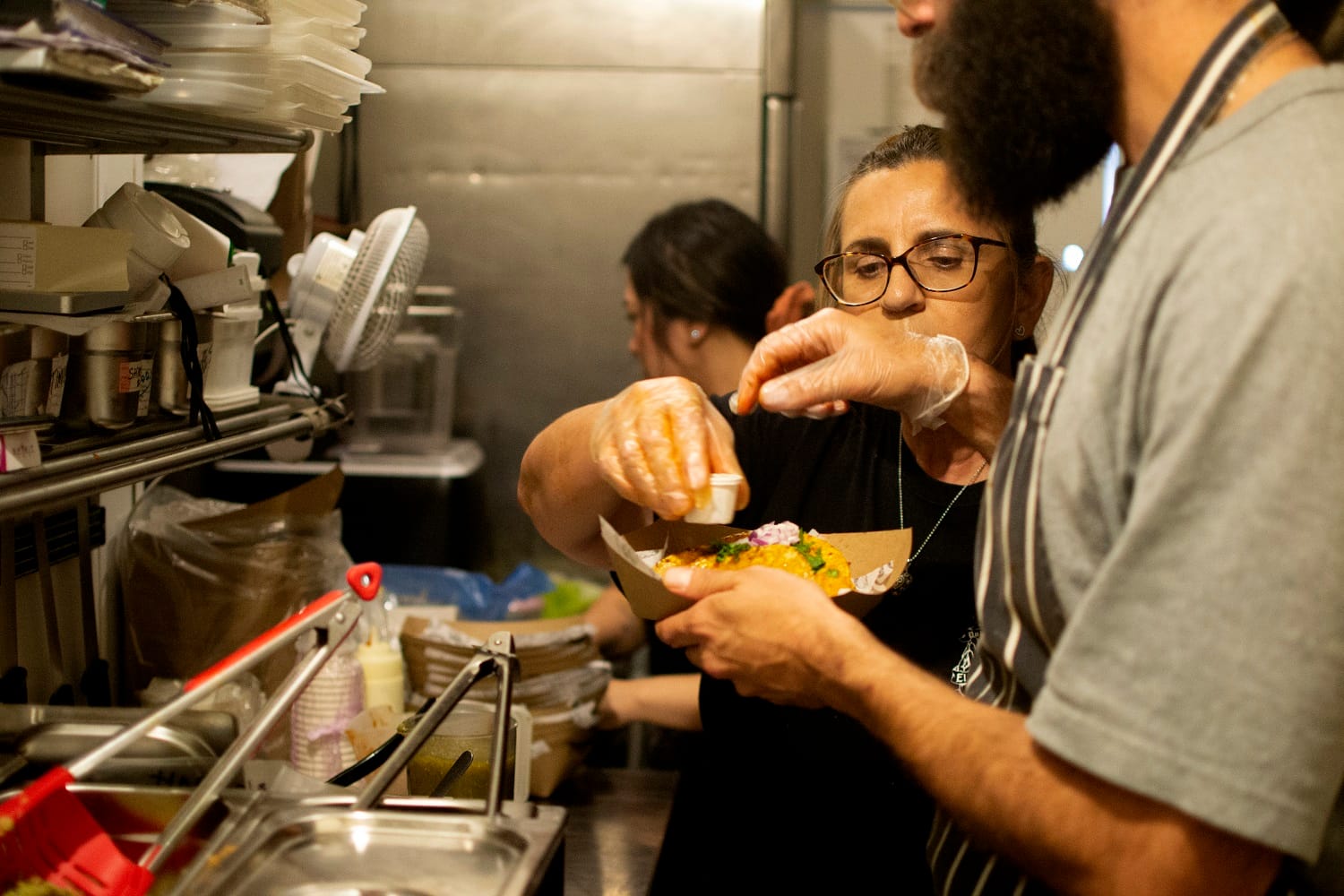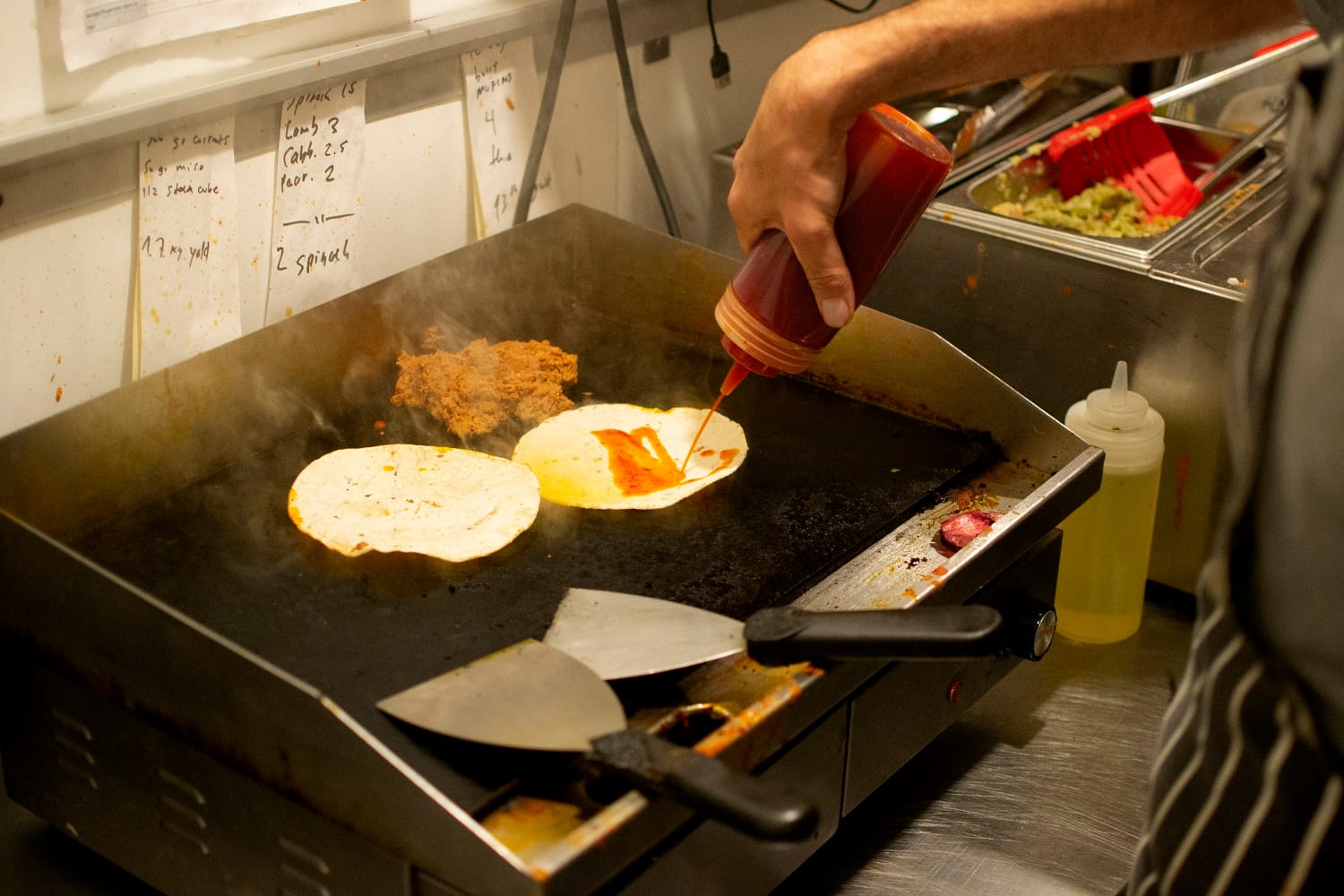What’s the best way to tell area residents about plans for a new asylum shelter nearby?
The government should tell communities directly about plans for new asylum shelters, some activists and politicians say.
Maria Isabel Pascual, her son Julian Trejo Pascual and their team at El Milagro feed hungry bellies in Stoneybatter, in Malahide, and on Francis Street.

On Friday, Maria Isabel Pascual was cutting a fresh tomato inside the tiny kitchen at the back of Love Supreme café in Stoneybatter.
A small white fan swirled in front of her, blowing around air and the warm aroma of the taco fillings that bubbled on the counter in a bain-marie.
Behind Pascual, Karen Baron cheerfully chopped coriander leaves, prepping them to sprinkle on beds of tortilla chips.
Julian Trejo Pascual, Maria’s son, hovers, talking as they cook.
The two women nudge and bump into each other as they reach for a knife or a tortilla and move around in the tiny gap between the two counters to the left and right of the kitchen, but nobody seems too bothered by the close quarters.
Since June 2021, when Maria and Julian launched their small food business, El Milagro, they have set up in the backs of bars and cafés and food trucks all across the city.
Along the way, Julian says, he has discovered things about his mum he never noticed growing up. While Maria Isabel found patience and kindness in her son, she says.
All, they say, over tacos, salsa and tortillas. “It really helped us to reconnect,” Julian says.
El Milagro means “the miracle”, says Julian.
The name is printed on their t-shirts alongside a portrait of the Virgin Mary watching over and blessing a car.
It’s an ode to the Catholic culture still rippling through society in Ireland and Mexico where he was born, he says.
“I feel like we’re both come from a very Catholic place, not that we’re Catholic or we’re not Catholic, but it’s indent in our culture,” he says.
Julian set up El Milagro because migrating to a new place, he says, can permanently erode your feelings of belonging anywhere.
“You know the kind of homelessness feeling that you get? You don’t feel at home when you’re here, you don’t feel at home when you go back,” said Julian, keeping an eye on the orders as they come in through a squawking printer.

Julian, 31, had already lived in Europe for 12 years before moving to Ireland. With a degree in media and politics, for two of those years, he worked as a multimedia journalist in Germany.
He always pined for something that’d help him shake that out-of-place feeling, he says. “I guess I always tried to find my spot within the city, within Dublin, within Berlin. I was always trying to find a spot for me.”
In Dublin, turning to authentic Mexican food felt like a no-brainer way to make a strange city feel like home, he says. Everything quickly came together.
In 2020, his mum had retired from the family business selling women’s bags and accessories in Mexico City, says Julian.
She had moved to Germany in December that year, spending time with her other son. She had wanted to settle in Spain and set up a business there, but a quick visit to Ireland to see Julian made her want to settle for good, he says.
“And we’ve been doing it for like a month, and she was like, ‘What’s the point of me starting a different business, when you have this business, and it’s going well, and you need help?’” says Julian, as his mum, who’s not yet fluent in English, smiles and nods.
Maria says there’s an instant satisfaction from selling food on the street that she struggled to find in trading purses.
“When you sell a bag, maybe sometimes, like two months later, they come back to get another one, they’re like, ‘Oh it was a really good bag, it was sturdy or whatever,’” she says through her son.
But with food? It’s immediate, she says. “You just have to put it in your mouth.”
El Milagro’s taco truck first sprang up on Camden Street, serving food at the Camden Court Hotel. Later, it moved to Malahide, where the team still sells tacos at the Picnic Park in Marina Village from Wednesday to Sunday.
Since March, they have worked at the bar, Anti Social, on Francis Street too. Says Julian: “We started little by little, like a pop-up week, we come, and we go, but slowly, slowly, we start taking over, and now we’re there seven days a week.”
Friday evenings mean Love Supreme café. Antonia Kenny, the wine bar manager at the café, says their customers love the tacos; among them are revellers who have tried the food at festivals and come to relive the experience.
“Last week, we had three or four people who were at festivals who came for tacos here,” says Kenny, who had stepped into the kitchen to give special instructions about a child’s order.
They shake up the menu every week.
On Friday, they served beef birria, tacos filled with meat marinated in a soupy stew. There was quesadilla sincronizada to order too, Mexican-style ham and cheese.
And totopos, fresh tortilla chips served with toppings of salad and guacamole, for vegans and vegetarians.
At the moment, El Milagro employs five people.
When it started last June, Julian posted a job advert on the Facebook page “Mexicans in Dublin”. Baron was first to respond.
A few months later, Julian applied for a work permit for her so that she could stay. It came through only a couple of months ago, they say.
Baron, who came to Ireland as an English language student, says she never thought of having a shot at staying through a work permit.
She’d moved from the south of Mexico to Madrid first, she says, but not having European papers made life complicated, so she came here to study English as she’d heard some Mexicans do.
She juggled working between an Italian restaurant and El Milagro for a while but decided to stay with the latter full-time.
“Because of the vibe of the place. He as a boss, she as a boss, they’re great people,” says Baron, pointing at Maria, who is busy pouring sauce into tiny cups.
Without the work permit, she was planning to enrol in college, she says. “Just for staying here.”
Says Baron, smiling: “This opportunity really gave me a lot of confidence. That made me feel like a part of something.”
Julian had left Mexico City first for Madrid early on so never got to appreciate his mum’s tenacity and hard work as an adult, he says.
Working with her at El Milagro put all that in full view. “I learned how really really good she is at business,” he says as her mum takes a break sitting on the steps at the back of the kitchen with a glass of red wine.
Last week, his mum, who’s almost 60, worked from 11am in the morning to 11pm at night, he says. “I’m always like, ‘Mum, you need to take a break.’”
That she doesn’t speak much English but still shows up means so much, Julian says, especially watching how she is not afraid of taking orders and asking customers to write down what they want when she can’t understand them.
“And like she’s not bothered about it. It really helped us to reconnect,” he says.

Maria says she was proud to discover patience in her son, Julian relays.
“She didn’t know that I was patient, she says. She didn’t know how I treat people I work with. I treat them good, right?” he turns and asks his mum, laughing.
“Si, si,” she says, nodding.
But making it all work isn’t as smooth as it sounds.
One frustration, Julian says, is the unseen effort and care that street food vendors like himself put into cooking and preparation.
There’s this idea that street food is made hurriedly using cheap pre-made ingredients so it shouldn’t cost that much, he says, making the market highly competitive.
“We spend maybe 20 hours a week in the kitchen, just making all the food for the festivals,” says Julian. They don’t buy pre-made stuff, he says.
It’s getting harder to keep to expected prices as the cost of everything jumps up, says Julian, who sells two tacos of all flavours at a fixed price of €11, albeit it costs them more for the shrimp ones.
But upping their price might confuse customers and complicate things and they make a profit on beef, pork and chicken tacos anyway, he says. “The margin is smaller on that, but it’s not crazy different.”
Despite everything, Julian says he is hopeful they can ride out the inflation crisis and set up a restaurant in the city in a couple of years.
“If you can make it in a truck, you can make it anywhere,” he says as he fries meat and shell for a beef birria order.
Get our latest headlines in one of them, and recommendations for things to do in Dublin in the other.